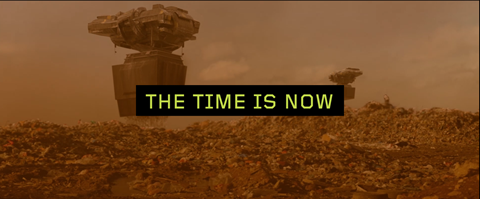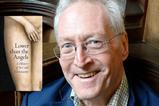Asif Kapadia’s latest film blends dystopian fiction with chillingly real archive footage to portray a future shaped by authoritarianism, climate catastrophe and tech tyranny. But in a world that already feels on the brink, is 2073 a wake-up call - or a cause for despair?

There was a time when post-apocalyptic drama offered a thought-provoking entertainment, but with the world today in a state of crisis, the genre is arguably a less popular diversion. After all, many of us feel we’re currently living out a sci-fi movie.
Perhaps this is why the film 2073 hasn’t had too much attention. Released at the beginning of the year, there was just one screening at my local independent cinema and I almost didn’t go. But I’m glad I did.
Part documentary, part drama, the film presents an imagined future 50 years from now. Civilisation has collapsed, drones fly overhead, armed police and facial recognition cameras ensure no one slips through the net. The world has been destroyed by fires, floods and war, chairwoman Ivanka Trump is in her 30th year of power, and art and literature are forbidden.
Living alone and underground in a deserted shopping centre in a ‘New San Francisco’, is Ghost, played by Samantha Morton. Attempting to remain off grid, she trusts no one and has stopped speaking. We hear from her through her interior monologue.
Her nightmares are presented as real life news clips showing how, through the will and actions of populist politicians and tech billionaires, we are all in danger of living out Ghost’s reality – only the disintegration of our world may arrive sooner than 2073.
It’s a challenging watch, not least because the archive footage of protests, elections, natural disasters and conflicts is so familiar and recent. Images of key protagonists Donald Trump, Narendra Modi and Nigel Farage, among many other leaders and rulers, highlight the dominance of right-wing politics. Pictures of Elon Musk, Jeff Bozos and Mark Zuckerberg remind us of the all-pervading influence of the tech giants, in cahoots with, and directing, authoritarian leadership. Journalists, activists and technologists are interviewed, sharing their fears and warnings, their frustrations with the mainstream media, and their battle to find and report on truth.
There were few surprises in this film. The shock comes from having it all pieced together, stressing the severity and imminence of the threat to life as we know it.
Authoritarian rule now controls 72 per cent of the world’s population. Data-harvesting, surveillance and profiling are normal. Artificial intelligence threatens jobs, privacy and integrity. Environmental disasters, experienced by communities globally, are being ignored as leaders and decision-makers side with oil companies and big business for short term profit and power. Throughout it all, our apparent acceptance and complacency means that we are on a knife edge – one commentator claims that one single change of government could be all it takes to see us living under a global dictatorship in the apocalyptic landscape presented here as a sci-fi drama.
Ghost tells us: “No one did anything to stop them. It’s too late for me. I was alone. It may not be too late for you.”
The film feels like a call to action. It was conceived by award-winning director Asif Kapadia who said that, in lockdown, he was confronted with a view of the world his teenage children were likely to inhabit and didn’t want to leave doing something about it to them and their peers.
Best known for his three films Senna, Amy and Diego Maradona, he is a highly regarded genre-defying filmmaker. He took time to attend the screening of 2073 in a small town in Suffolk and it was this Q&A event which lured me to buy a ticket, along with around 100 other people.
He was eloquent and passionate about his subject and its inspiration. But when he was asked, by young film students present, how he hoped he might see his audience respond, his answers seemed flippant and dismissive. We should come off social media, he said. That was about it. Had he already given up or is it really that simple? Algorithms are undoubtedly increasingly directing behaviours but can we override something that seems to be an inextricable part of modern life? It feels like we’re too far down the road, already.
What should we do about it?
There’s a danger with films like this, where they offer no resolution or alternative, that the audience can be left feeling despondent and demoralised, our worry and anxiety exacerbated, our sense of despair heightened.
As Christians we have our future hope to cling onto, and a belief in the almighty, omnipotent God. But there’s a danger, too, that in believing ‘God is in control’ we can be passive and retreat into a ‘holy huddle’, focused on coffee rotas and collection plates as if the world outside is of no concern.
There are three journalists whose work is highlighted in this film. They are all women and are experiencing huge challenges financially, professionally, physically and emotionally in calling out the influence of the tech giants and the authoritarian regimes. And they are isolated in their work, it seems.
Let’s pray with insight and authority. Let’s ask our church leaders to challenge us intellectually and spiritually
Their example challenged me as a journalist, and as a Christian. How are our church leaders responding to the complexities of life today? How are we each taking individual responsibility and acting practically and prayerfully? The situation may seem too big for any of us to make a difference, but should that stop us?
We were urged as an audience at the cinema to cherish our being together, and to use it to galvanise conversation and action, instead of pursuing the isolation and fatalism encouraged through the internet and social media.
Sales of Tesla cars have plummeted since owner Elon Musk started working in government office. The global pandemic made a radical intervention in behaviours in travel, consumerism and community. Change can happen. And in the film, when she is finally captured and interrogated, Ghost is asked “do you pray?” Her response was a wry smile.
The church body is a community of believers. Let’s pray with insight and authority. Let’s ask our church leaders to challenge us intellectually and spiritually. Let’s support individuals and organisations who are seeking to make a difference, acting against persecution, poverty and oppression. Let’s equip ourselves to be able to speak out to our neighbours, colleagues and friends about the world picture as we see it biblically. And let’s reach out to people around us who are struggling and isolated.
Surely we have a responsibility as salt and light to be better informed, and better energised, in the world situation today - and change is possible.
2073 is now available to stream online





































No comments yet